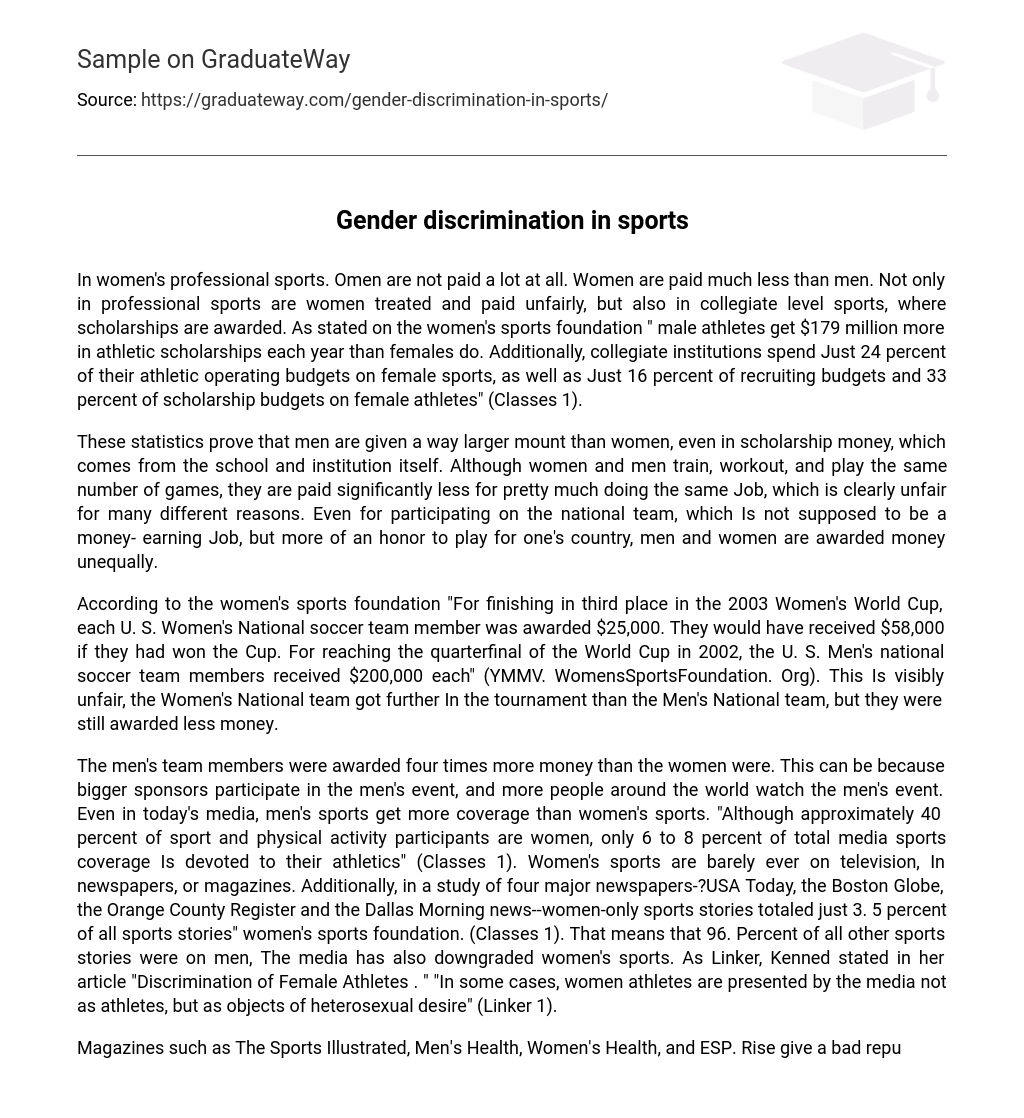In women’s professional sports. Omen are not paid a lot at all. Women are paid much less than men. Not only in professional sports are women treated and paid unfairly, but also in collegiate level sports, where scholarships are awarded. As stated on the women’s sports foundation ” male athletes get $179 million more in athletic scholarships each year than females do. Additionally, collegiate institutions spend Just 24 percent of their athletic operating budgets on female sports, as well as Just 16 percent of recruiting budgets and 33 percent of scholarship budgets on female athletes” (Classes 1).
These statistics prove that men are given a way larger mount than women, even in scholarship money, which comes from the school and institution itself. Although women and men train, workout, and play the same number of games, they are paid significantly less for pretty much doing the same Job, which is clearly unfair for many different reasons. Even for participating on the national team, which Is not supposed to be a money- earning Job, but more of an honor to play for one’s country, men and women are awarded money unequally.
According to the women’s sports foundation “For finishing in third place in the 2003 Women’s World Cup, each U. S. Women’s National soccer team member was awarded $25,000. They would have received $58,000 if they had won the Cup. For reaching the quarterfinal of the World Cup in 2002, the U. S. Men’s national soccer team members received $200,000 each” (YMMV. WomensSportsFoundation. Org). This Is visibly unfair, the Women’s National team got further In the tournament than the Men’s National team, but they were still awarded less money.
The men’s team members were awarded four times more money than the women were. This can be because bigger sponsors participate in the men’s event, and more people around the world watch the men’s event. Even in today’s media, men’s sports get more coverage than women’s sports. “Although approximately 40 percent of sport and physical activity participants are women, only 6 to 8 percent of total media sports coverage Is devoted to their athletics” (Classes 1). Women’s sports are barely ever on television, In newspapers, or magazines. Additionally, in a study of four major newspapers-?USA Today, the Boston Globe, the Orange County Register and the Dallas Morning news–women-only sports stories totaled just 3. 5 percent of all sports stories” women’s sports foundation. (Classes 1). That means that 96. Percent of all other sports stories were on men, The media has also downgraded women’s sports. As Linker, Kenned stated in her article “Discrimination of Female Athletes . ” “In some cases, women athletes are presented by the media not as athletes, but as objects of heterosexual desire” (Linker 1).
Magazines such as The Sports Illustrated, Men’s Health, Women’s Health, and ESP. Rise give a bad reputation to women, focusing only on their athletic bodies, not the talent. As seen on One of ESP. Riser’s latest issues Aqua’s Women’s National Team goalie Hope Solo is featured naked, covering her private parts, but emphasizing her athletic body, on the cover. (Mort 1) This magazine issue caused some chaos in the sports media world, especially among the National Team Committee.
Another media source that downgrades women’s sports is the Lingerie Football League that can be seen on MATT. Females are degraded by their male counterpart. Sexism in sporting events is hurting many young female athletes and their families. Women are always said to be weak and more fragile than men. In the past, it was said women were unable to play sports due to medical reasons because their bones were too delicate and organs loud not be able to work sufficiently during sports. According to an article written by Leslie struck. The Olympics did not admit women athletes until 1912. Women could not compete in the marathon competition until 1984, partially because some medical experts thought that women could injure their organs by participating”. To people nowadays, that reasoning sounds absurd, but that is how males viewed women. Women are said to be less successful and unable to participate in all male sports. Although they might not have the same speed, quickness, or strength as men o, they have other technical, tactical, and mental necessities for sports that men do not have.
Although many people would think gender differences have disintegrated and equality has arisen, it has, buts not completely. Gender discrimination in the athletics industry has long been a controversial topic–even the founder of the modern Olympics, Baron Pierre De Cooperation, said in 1896, ‘No matter how toughened a sportswoman may be, her organism is not cut out to sustain certain shocks. This is still an everyday issue that females all around the world fight for. Many Asian and Eastern European countries such as Saudi Arabia, Iran, and Iran, do not even allow their women to participate in sports.
To people in the United States, this seems ridiculous, but it is true. For example, the United States is one of the only countries that has a women’s professional soccer league; most of the other countries have men’s, but not women’s Many things can be done to help the issue on female sports discrimination. People can go to more women’s sporting events, donate to companies that support women’s sports, encourage television stations and newspapers to cover more of it, and encourage youth girls to participate in sports.





